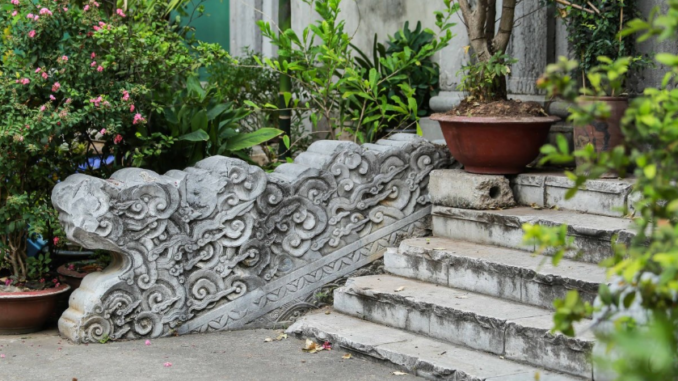
Hoang Cao Khai’s tomb area is 17 hectares wide, made entirely of white marble, like a miniature court.

Hoang Cao Khai’s tomb area is located at Lane 252, Tay Son Street (Dong Da, Hanoi), built by Governor-General Hoang Cao Khai (1850 – 1933), in 1893. At that time, he set up an area. a large area of land for burial and sacrifice for his family.

Hoang Cao Khai Hamlet has a total area of 17 hectares, is a complex of 14 architectural works on tombs and pagodas such as: Tomb of Hoang Cao Khai, Tomb of Hoang Trong Phu, Nghinh Phong hill, Tam Nguyet lake, temple area. worshiping the Hoang family with seven pavilions in the style of folk architecture… are scattered in the western area of Dong Da mound.

The mausoleum is made entirely of marble, a rare and precious stone popular in Asia. This is the largest stone work in Hanoi and the second largest in Vietnam after the Ho Citadel (Thanh Hoa). To build and design this mausoleum, Hoang Cao Khai invited many French and Vietnamese architects to participate in the design.

Particularly, Hoang Cao Khai’s mausoleum was built in the “Dinh” style, 8 m long, 6 m high, the ceiling is more than 4 m from the floor. In the middle there is a wide white stone table, Hoang Cao Khai’s grave is on the left, his wife’s grave is on the right.

The stone to build the mausoleum was brought back from Quoc Oai (former Ha Tay) and through the hands of famous craftsmen around An Hoach mountain (Dong Son district, Thanh Hoa). The main motifs carved on stone are lotus flowers, pine needles, and dragon heads with bold architectural imprints of the Nguyen Dynasty at the end of the 19th century.

In terms of overall architecture, the Tomb of Hoang Cao Khai and Hoang Trong Phu have many similarities. But in terms of scale, the mausoleum of Hoang Trong Phu’s son built behind is more massive than his father’s mausoleum. The entire cross-section of the mausoleum is 15m long, divided into many small areas, the ceiling is also over 4m high with typical motifs and Chinese characters.

In front of the mausoleum, there are two rows of stone statues consisting of 8 warriors about 1.3 m high. After more than 100 years of construction, so far only 3 incomplete structural statues remain.

The mausoleum area was classified as a National Monument in 1962. The urbanization process of the city makes the Hoang Cao Khai Tomb Relic area now have households located in the mausoleum protection area. Some people also call this street yin – yang, where people have lived with the dead for nearly 30 years.
Photo: Huu Thang
